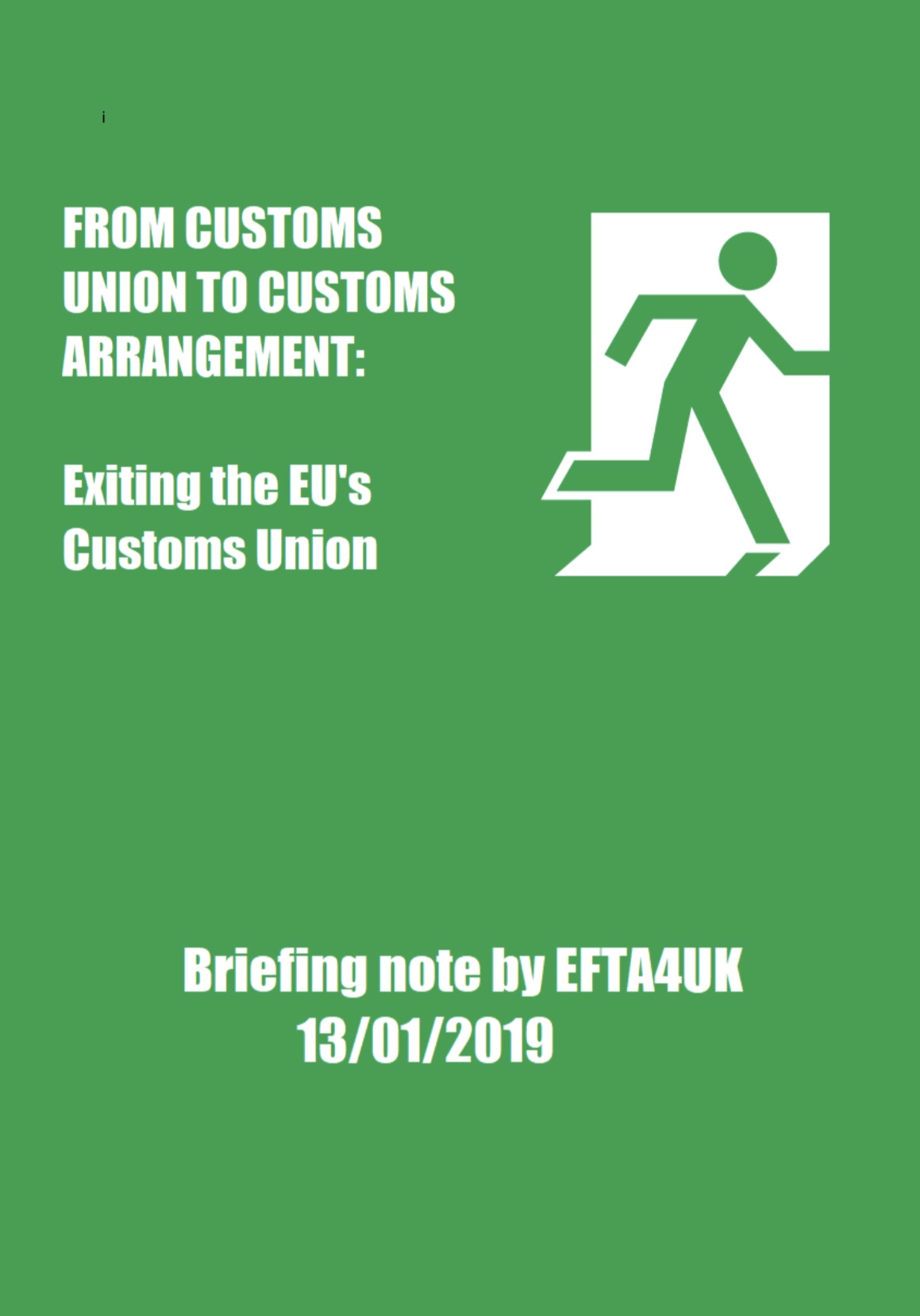The grassroot movement EFTA4UK has today published a new report: From Customs Union to Customs Arrangement. Exiting the EUs Customs Union.

The report references my SmartBorder 2.0 report and the work I have done on SmartBorder develoment.
EFTA4UK writes,
The UK will certainly leave the European Union’s Customs Union. This is an incontrovertible fact of leaving the European Union.
Participation in the EU Customs Union (EUCU) is factually only available to EU member states.
• It is possible however, to enter into ‘a’ customs union with the EU, something the UK should pursue in the short term; in fact, this is current Government policy.
• Once the UK has left the EU and the necessary preparations and negotiations have been made, the UK and EU should mutually terminate the transitional EU-UK customs union and replace it with an advanced EU-UK Customs arrangement; which would allow for near-frictionless trade and mean no hard border on the Island of Ireland. This would also allow the UK to strike new FTAs (Free Trade Agreements) around the globe.
By definition, being in a customs union places restriction on UK trade policy.
Symbolically remaining in the/a customs union with the EU would be unacceptable to those parliamentarians and members of the public who seek to ‘take back control’ from the EU.
It would therefore be unsustainable for the UK to remain in a customs union with the European Union in the long term. We should therefore use the transition period to negotiate a new bilateral bespoke customs arrangement between UK and EU.
This would be made up of:
• New technologies and systems (as outlined by Mr Maesson and Mr Karlsson) combined with international best practice as recommended by the WCO.
• Negotiated access to the REX system.
• A new protocol to be added to the EEA agreement specifically relating to NI/ROI trade, with the creation of a new joint committee to oversee border issues.
• All parties upholding their commitments and duties under existing international agreements.
You can read the report here:
EFTA4UK Report: From Customs Union to Customs Arrangement. Exiting the EUs Customs Union
We are now two weeks into the new year. From a Customs and Trade perspective – what will be the big megatrends this year? These are in my mind the most important areas 2019:
- BREXIT
- DIGITALIZATION
- ECOMMERCE
- TRADE WARS
- AEO-TRUSTED TRADERS

We are quickly approaching March 29th, 2019, when the United Kingdom leaves the European Union. Brexit is the biggest Customs chabge in our lifetime. It will have enormous impact on how we handle borders not only around UK but everywhere in the world. You will be able to read more about this later on this blog.
We have only scratched the surface of how digitalization will change international trade and our entire industry. The revolution will start in 2019. Every month I will publish reflection on different areas of technology in our business.
ECommerce has for a decade been the elephant in the room. Already last year we saw how some countries, like e.g Sweden started changing the paradigm for eCommerce-postal. This will be one of the fundamental questions tonsolve for the years to come and it starts this year. I will shortly write about the potential solutions for eCommerce, so keep reading the blog.
Last year was a year when protections did a come-back after years in the shadows. We have seen energing trade wars between the major trade blocks and this will continue also in 2019. What can we do about it? Read this blog and you will know.

This will also be the year when a new paradigm for Authorised Economic Operastors-Trusted Traders will become more visual. The change started already 4-5 years ago, now the tsunami will hit. Read about it here.
One thing is certain, it will the most interesting year in Customs and Trade ever. Remember where you read it first.
Belgian Customs does not find enough staff for Brexit. Over the last period of time it has become clear that there will not only a lack of competence and capcity in the trade industry due to Brexit, but also on the Customs side.
Belgian customs has recently announced that they do not have enough candidates to fill all vacancies due to Brexit. Approximately half of the 141 places will be filled at the beginning of January.

It is expected that at the time of Brexit at the end of March, 105 new staff members have started according to the Belgian magazine Knack.
The Ministry of Finance acknowledges the problems with recruitment, but insists that on March 29, 2019, when the Brexit takes effect, all places are filled.
If necessary, staff members from other departments will be transferred, according to a spokesperson against the Belgian magazine. A communication that meets opposition from the trade union angle.
Last year when Minister of Finance Johan van Overtveldt reported that 141 extra workers were needed for the Brexit even though according to some sources in the ministry, these will be too few. There should be at least three hundred for a soft Brexit, as in the recently concluded agreement between the UK and the EU, and four hundred for a hard no-deal Brexit situation.
Customs is also working hard to recruit staff in the Netherlands. The expectation is that the work will increase sharply once the British have left the EU, regardless of how. In October it became clear that the Dutch government department needed nine hundred new employees.






You must be logged in to post a comment.